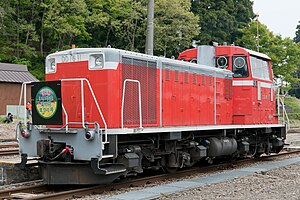The Class DD16 (DD16形) is a four-axle Bo-Bo wheel arrangement diesel-hydraulic locomotive type operated in Japan since 1972. A total of 65 locomotives were built between 1971 and 1975, and as of 1 April 2016[update], one locomotive remains in service, operated by East Japan Railway Company (JR East).
| Class DD16 | |||||||||||||||||||||||||||||||||
|---|---|---|---|---|---|---|---|---|---|---|---|---|---|---|---|---|---|---|---|---|---|---|---|---|---|---|---|---|---|---|---|---|---|
 JR East DD16 11 in service in May 2009 | |||||||||||||||||||||||||||||||||
| |||||||||||||||||||||||||||||||||
| |||||||||||||||||||||||||||||||||
| |||||||||||||||||||||||||||||||||
| |||||||||||||||||||||||||||||||||
Variants
editA total of 65 locomotives were built between 1971 and 1975.[1]
- Class DD16-0: 65 locomotives built between 1971 and 1975
- Class DD16-300: 4 locomotives converted from DD16-0 locomotives between 1979 and 1983 to become self-propelled snowplough units[2]
Design
editThe Class DD16 was designed to replace the Class C12 and C56 steam locomotives on non-electrified rural lines where locomotives with a low axle load were required.[2] The design featured an offset centre-cab arrangement using the same DML61Z diesel engine used in the Class DD51 locomotives, derated from 1,000 hp (750 kW) to 800 hp (600 kW).[2]
History
editThe first two locomotives, DD16 1 and 2, were built at the Japanese National Railways (JNR) Nagano factory, and these were tested on the Koumi Line and Iida Line.[1]
Between 1979 and 1983, four locomotives (DD16 2, 5, 4, and 13) were converted at JNR's Nagano and Matto workshops to become self-propelled snowplough units, numbered DD16 301 to 304, with the addition of bogie snowplough units on either end.[3]
-
Snowplough unit DD16 303 in service on the Oito Line in February 1991
With the closure of many rural lines and discontinuation of rural freight services in the 1980s, many of the class were withdrawn from operation and scrapped.[1]
With the privatization of JNR in April 1987, just ten Class DD16 locomotives remained in service, transferred to operation by JR Group operating companies.[4]
By 1 April 1995, seven locomotives were still in service, with four (DD16-0 and DD16-300) operated by East Japan Railway Company (JR East), two (DD16-0) operated by Kyushu Railway Company (JR Kyushu), and one (DD16-300) operated by West Japan Railway Company (JR West).[3]
-
JR East DD16 20 in October 1999 at Omiya Works, where it was used as a works shunter, repainted in "Hokutosei" blue livery
-
JR East DD16 36 in August 1994 at Omiya Works, where it was used as a works shunter, repainted in "Hokutosei" maroon livery
-
JR Kyushu DD16 62 at Kagoshima Depot in August 1998
As of 1 April 2016[update], one locomotive, DD16 11, remains in service, operated by JR East.[5]
Preserved examples
editAs of 2014[update], seven Class DD16 locomotives are preserved.[6]
- DD16 1: Preserved at Nagano General Rolling Stock Center in Nagano
- DD16 7: Preserved in operational condition at Wakasa Station on the Wakasa Railway
- DD16 15: Preserved at the Mikasa Railway Parek in Mikasa, Hokkaido
- DD16 17: Preserved at the Otaru Museum in Otaru, Hokkaido
- DD16 31: Preserved inside the "Memorial Ship Hakkoda" in Aomori
- DD16 64: Preserved in Nōgata, Fukuoka
- DD16 303: Preserved in Nagano
- DD16 304: Preserved at the Tsuyama Railroad Educational Museum in Tsuyama, Okayama.[7]
-
DD16 7 on the Wakasa Railway
-
DD16 15 at the Mikasa Railway Park in May 2007
-
DD16 17 at the Otaru Museum in August 2009
-
DD16 31 inside the "Memorial Ship Hakkoda" in Aomori in September 2014
-
DD16 20 in Taiwan in August 2009, where it was used on the Taiwan High Speed Line
Classification
editThe DD16 classification for this locomotive type is explained below.
- D: Diesel locomotive
- D: Four driving axles
- 16: Locomotive with maximum speed of 85 km/h or less
References
edit- ^ a b c Inoue, Kōichi (1999). 国鉄機関車事典: 蒸気・電気・ディーゼル機関車66形式 国鉄機関車辞典 [JNR Locomotive Encyclopedia] (in Japanese). Japan: Sankaido. pp. 172–173. ISBN 978-4-381-10338-3.
- ^ a b c Ishii, Yoshitaka (2004). Dd51物語: 国鉄ディーゼル機関車2400両の開発と活躍の足跡 DD51物語 [The DD51 Story] (in Japanese). Tokyo, Japan: JTB Can Books. pp. 139, 188. ISBN 978-4-533-05661-1.
- ^ a b JR全車輛ハンドブック1995 [JR Rolling Stock Handbook 1995] (in Japanese). Japan: Neko Publishing. 1995. pp. 63–64.
- ^ Jr機関車カタログ: Jr7社の現有30形式を詳しく解說 JR機関車カタログ [JR Locomotive Catalogue] (in Japanese). Japan: Ikaros Publications Ltd. 20 June 2013. p. 91. ISBN 9784863207271.
- ^ Miyahara, Masakazu, ed. (December 2016). 国鉄最終章LAST (鉄道ジャーナル2017年2月号別冊) [JNR - The Final Chapter (Railway Journal February 2017 Extra issue)]. Tetsudō Jānaru (in Japanese). Japan: Railway Journal: 39–41. ASIN B01N59AJPB. ISSN 0288-2337.
- ^ Sasada, Masahiro (25 November 2014). 国鉄&jr 保存車大全 2015-2016 国鉄&JR保存車大全2015-2016 [JNR & JR Preserved Rolling Stock Complete Guide 2015-2016] (in Japanese). Tokyo, Japan: Ikaros Publications Ltd. p. 123. ISBN 978-4863209282.
- ^ Shibata, Togo (February 2016). 2016年「津山まなびの鉄道館」としてリニューアルオープン [Reopening in 2016 as "Tsuyama Railroad Educational Museum!]. Tetsudo Daiya Joho Magazine (in Japanese). Vol. 45, no. 382. Japan: Kotsu Shimbun. pp. 46–47.